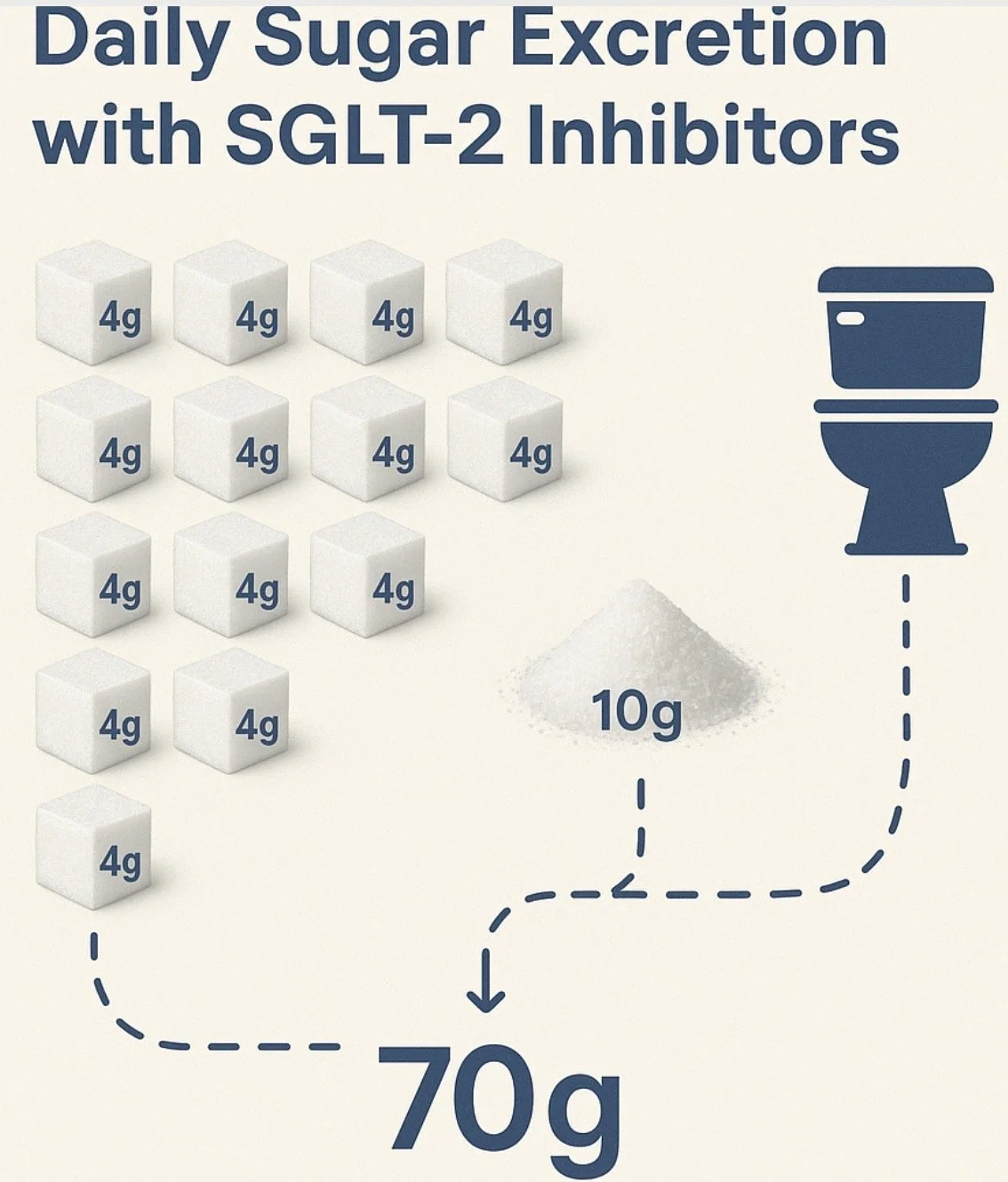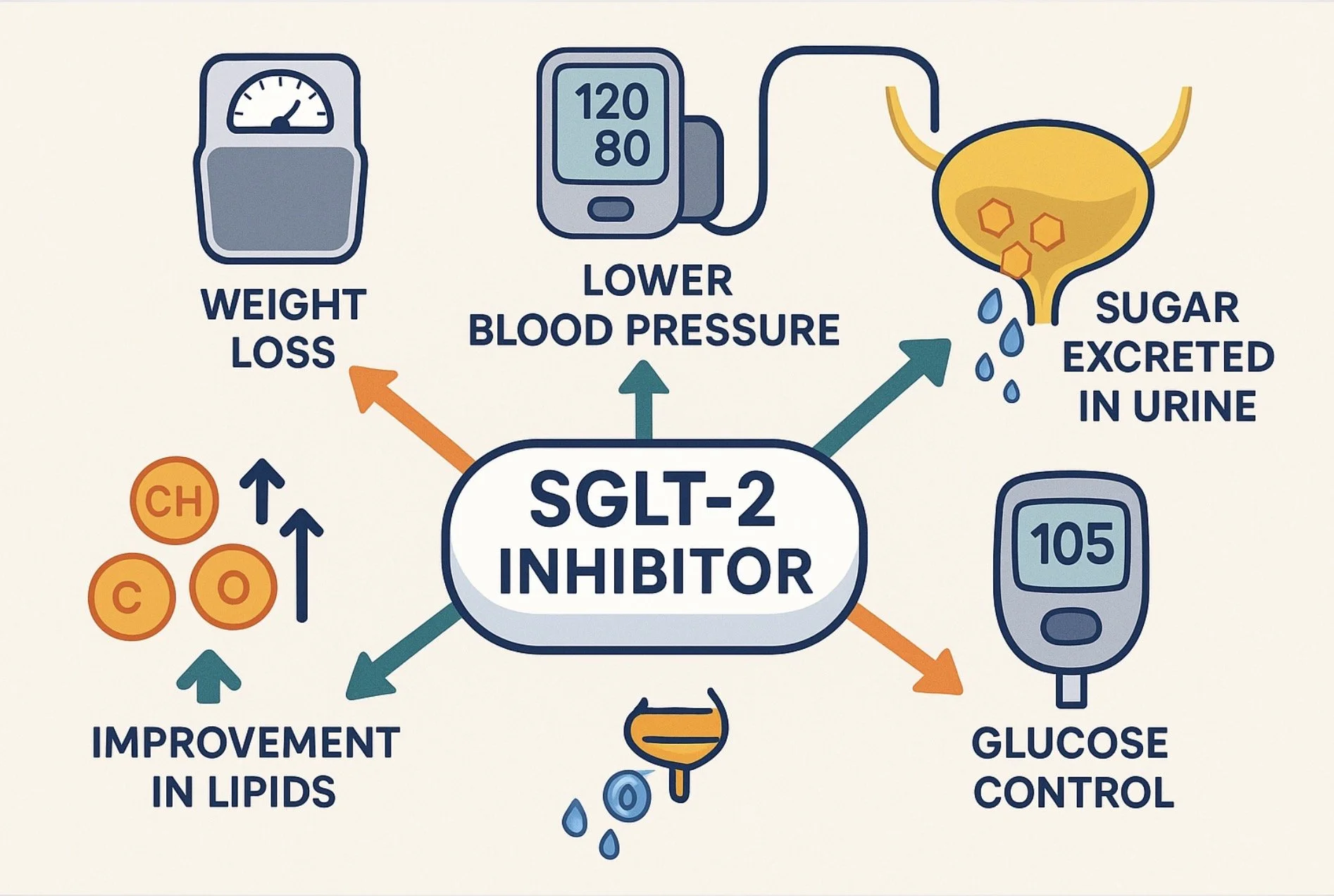
Sweet Pee, Sweeter Outcomes: where sugar in your wee is a good thing
by Dr. Stephen Lawrence

What else do SGLT-2 inhibitors do?
Move over, conventional diabetes medicines—a relatively new class has been quietly transforming care since dapagliflozin first got its UK licence way back in November 2012. But it’s only in recent years that the true value of SGLT-2 inhibitors has come into focus, outshining earlier expectations not just for people with type 2 diabetes, but for those with heart and kidney problems, too. Their trick is as odd as it is effective: these unique tablets help you “wee” your sugar away. For those a few with long memories, we used to diagnose Diabetes by testing for sugar in the wee. Yes, SGLT-2 inhibitors allow you to literally dispose of around 70g of excess glucose daily via your urine, turning the bathroom into—dare we say—a surprising hero of health (apologies to plumbers everywhere).
But let’s get beneath the quirky headlines. What makes SGLT-2s fundamentally different from all other diabetes medicines? Traditional oral drugs and injectables usually rely on tweaking insulin, wrangling beta cells or modifying digestion—often with limited extra benefits beyond blood sugar. SGLT-2 inhibitors, though, bypass all that by recruiting your kidneys to clear sugar the natural way. One tablet a day, no needles required. It doesn’t stop there, the ripple effects go further:
• Gentle weight loss (around 4%)
• Modest but meaningful blood pressure drops
• Improved cholesterol profiles
• Proven reductions in both heart failure and heart attack risk
• Better blood glucose control overall
The science behind SGLT-2s isn’t just solid, it’s now transformative, prompting the recent NICE guideline shake-up to move these drugs to frontline therapy for type 2 diabetes. Yet despite this revolution, real-world access remains uneven. If you’re older, female, Black, or living in a deprived area, you’re statistically less likely to be prescribed these medicines—even though you may stand to gain the most from their broad benefits. This is the challenge that faces all modern diabetes care: making sure the sweet solutions reach everyone and don’t just echo the old inequities.
Still, it’s vital to remember that SGLT-2 inhibitors, while remarkable, aren’t for everyone. Not all people living with type 2 diabetes will be suitable for these tablets—medical conditions like advanced kidney disease, frequent urinary tract infections, or certain other health factors can make them less appropriate. For most, though, the potential benefits are worth consideration, and every patient should talk to their healthcare professional for advice tailored to their situation.
So, next time you hear about SGLT-2s, remember: this is the only diabetes medicine that literally flushes sugar out of your body, offering a modern melody of benefits from heart to kidneys to weight management. The goal now? To play this tune for every patient, every background, every postcode—so no one’s left waiting at the bathroom door. Only by acknowledging the risks, benefits, and unique mode of action can we tune diabetes care for the better, together.
What to Discuss With Your GP
Thinking about your diabetes treatment plan? Here are key questions to ask your GP or diabetes team at your next review:
• Could an SGLT-2 inhibitor be suitable for me, given my diabetes and other health conditions?
• What are the benefits of these tablets, and what makes them different from other diabetes medicines?
• How could SGLT-2s impact my heart health, kidneys, weight, and blood pressure?
• Are there any reasons why these medicines might not be right for me?
• How often are these newer treatments offered to people of my age, background, or community?
Remember: diabetes care is not “one size fits all.” If you think you could benefit from a more tailored approach—or just want to understand your options better—start the conversation. Asking about your choices is the first step to making sure modern diabetes care works for you.


